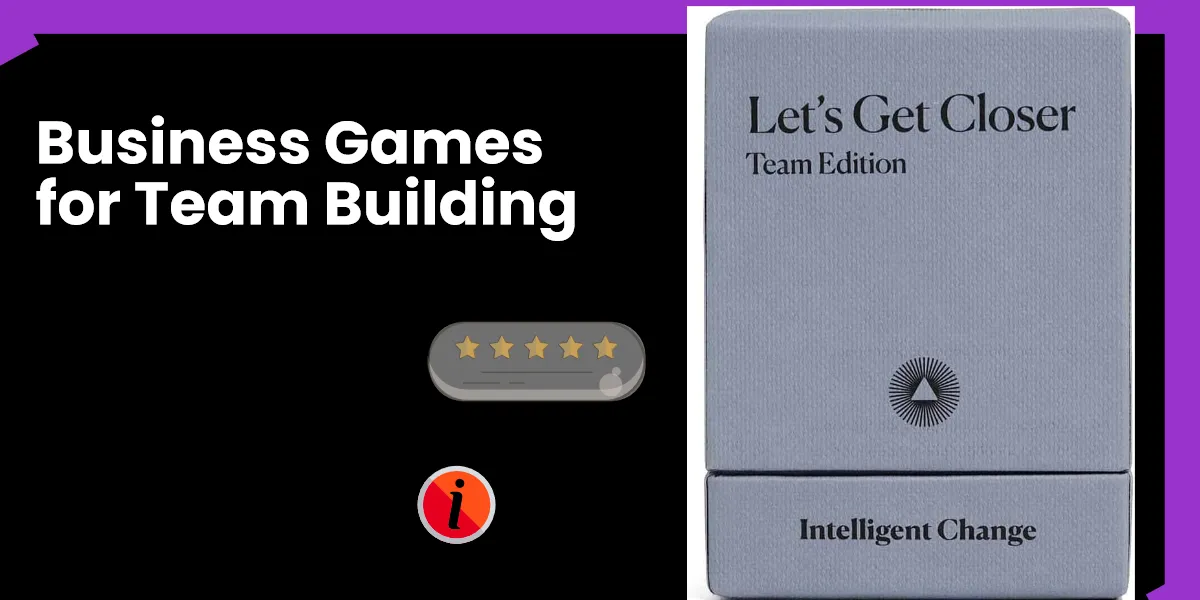Business Games for Team Building: Enhancing Collaboration and Problem-Solving Skills
Look no further than business games for team building.
These interactive and engaging activities have been proven to enhance collaboration, communication, and critical thinking among team members.
In today’s fast-paced and competitive business world, it is crucial for employees to work together efficiently and effectively in order to achieve success.
Business games provide a unique and fun approach to team building, allowing individuals to step out of their comfort zones and work together towards a common goal.
In this article, we will explore the benefits of incorporating business games into your team building strategies and how they can contribute to the overall success of your organization.
From icebreaker games to complex simulations, there is a wide range of options to choose from that cater to different team sizes, goals, and objectives.
So why wait? Read on to discover how business games can transform your team into a cohesive and high-performing unit.
Boost teamwork through interactive simulations
To enhance collaboration and problem-solving skills within your team, consider incorporating interactive simulations into your business games.
These simulations provide a dynamic and immersive experience where team members can actively engage and work together towards a common goal.
By participating in these simulations, individuals have the opportunity to practice effective communication, decision-making, and conflict resolution in a safe and controlled environment.
This hands-on approach allows teams to experience real-life scenarios and challenges, fostering a deeper understanding of team dynamics and promoting the development of essential teamwork skills.
Through interactive simulations, team members can collaborate, learn from each other’s strengths, and develop a shared sense of purpose, ultimately leading to improved productivity and success in achieving organizational goals.
Improve communication and decision-making
In the context of team building and enhancing collaboration and problem-solving skills, one important aspect to focus on is improving communication and decision-making.
Effective communication is essential for smooth workflow, reduced misunderstandings, and increased productivity within a team.
By utilizing business games that encourage open dialogue, active listening, and clear expression of ideas, team members can enhance their communication skills.
Additionally, incorporating decision-making exercises into these games allows individuals to practice critical thinking, weighing options, and making informed choices.
By engaging in these activities, team members can develop the ability to make timely and effective decisions, leading to improved outcomes and alignment towards shared goals.
Emphasizing the improvement of communication and decision-making skills through business games can greatly enhance team performance and overall success.
Encourage creative problem-solving techniques
To further enhance the collaborative and problem-solving skills of your team, it is crucial to encourage the use of creative problem-solving techniques.
By embracing a mindset that fosters innovation and outside-the-box thinking, your team can uncover unique solutions to complex challenges.
Introducing business games that require brainstorming, ideation, and creative problem-solving can stimulate the team’s imagination and encourage the exploration of unconventional ideas.
These games can provide a safe space for team members to experiment, take risks, and learn from failures, ultimately cultivating a culture of innovation within your organization.
By nurturing and supporting creative problem-solving techniques, your team will be better equipped to tackle any obstacles that come their way and achieve remarkable results in their collaborative endeavors.
Foster a collaborative work environment
To cultivate a collaborative work environment, it is essential to establish clear communication channels and encourage open dialogue among team members.
Encourage everyone to actively listen and value each other’s opinions and ideas.
Foster a culture where collaboration is seen as a strength rather than a weakness, and where individuals feel comfortable sharing their thoughts and perspectives.
Create opportunities for team members to collaborate on projects, allowing them to leverage their diverse skills and expertise.
Implementing regular team-building activities, such as group problem-solving exercises or collaborative brainstorming sessions, can also enhance collaboration and forge stronger connections among team members.
By fostering a collaborative work environment, you can harness the collective intelligence and creativity of your team, leading to increased productivity, innovation, and overall success in achieving the goals of your organization.
Enhance conflict resolution skills
In any professional setting, conflicts are bound to arise due to differing opinions, personalities, and work styles.
Developing effective conflict resolution skills is crucial to maintaining a harmonious and productive work environment.
By engaging in business games focused on enhancing collaboration and problem-solving skills, team members can sharpen their ability to navigate and resolve conflicts.
These games provide a safe and controlled space for individuals to practice active listening, empathizing with others’ perspectives, and finding mutually beneficial solutions.
Through these interactive experiences, participants can learn to manage conflicts constructively, fostering stronger relationships and promoting a positive team dynamic.
Strengthening conflict resolution skills not only leads to smoother interactions among team members but also contributes to overall team effectiveness and organizational success.
Nurture leadership and delegation abilities
To excel in business, it is essential to nurture your leadership and delegation abilities.
Effective leaders not only inspire and motivate their team members but also possess the skills to assign tasks, set goals, and empower others to take ownership of their work.
Engaging in business games that focus on enhancing collaboration and problem-solving skills can provide valuable opportunities to develop and refine these leadership qualities.
Through these games, you can practice delegating tasks, providing clear instructions, and trusting your team members to deliver results.
By honing your leadership and delegation abilities, you can create a more efficient and productive work environment, where everyone feels empowered to contribute their best.
This will not only enhance your own professional growth but also contribute to the success of the team and the overall organization.
Develop critical thinking and analysis
When participating in business games for team building, such as “Business Games for Team Building: Enhancing Collaboration and Problem-Solving Skills,” you have the opportunity to develop critical thinking and analysis skills.
These games often present complex scenarios and challenges that require careful evaluation and strategic decision-making.
By engaging in these activities, you can enhance your ability to analyze information, assess risks and benefits, and think critically to determine the best course of action.
Furthermore, these games provide a safe space to practice problem-solving techniques and explore different perspectives.
Developing critical thinking and analysis skills through business games can greatly benefit your professional development and contribute to your effectiveness as a leader in the workplace.
Strengthen team cohesion and morale
In addition to developing critical thinking and analysis skills, participating in business games for team building, such as “Business Games for Team Building: Enhancing Collaboration and Problem-Solving Skills,” can also greatly strengthen team cohesion and boost morale.
These games often involve collaborative problem-solving, requiring team members to work together towards a common goal.
Through these activities, you have the opportunity to build trust and improve communication within your team.
By working together to overcome challenges and achieve success in the games, team members develop a sense of camaraderie and a shared sense of accomplishment.
This can lead to increased motivation, productivity, and job satisfaction among team members.
Strengthening team cohesion and morale through business games fosters a positive and supportive work environment, enhancing overall team performance and driving success in the workplace.
Ultimately, incorporating business games into team building activities can greatly benefit your organization.
By promoting collaboration, problem-solving, and communication skills, these games can improve team dynamics and overall productivity.
Additionally, these activities can also be a fun and engaging way to boost employee morale and motivation.
Consider incorporating business games into your next team building event to see the positive impact it can have on your team’s performance.
FAQ
How can business games be effectively used as a team-building tool to enhance collaboration among team members?
To effectively use business games as a team-building tool to enhance collaboration among team members, you need to create a supportive and engaging environment.
Encourage everyone to actively participate and contribute ideas during the games.
Use games that require teamwork and problem-solving to promote collaboration and communication.
Set clear goals and objectives for the games, emphasizing the importance of working together to achieve success.
Provide feedback and debrief after each game, highlighting the strengths and areas for improvement in teamwork and collaboration.
By utilizing business games in this way, you can foster a stronger sense of unity and cooperation among team members.
What specific problem-solving skills can be developed through business games for team building?
By engaging in business games for team building, you can develop a range of problem-solving skills.
These games enhance your ability to think critically, analyze complex situations, and make effective decisions.
They also promote strategic thinking, as you learn to assess risks and opportunities in a competitive environment.
Additionally, these games improve your communication and collaboration skills, as you work with teammates to find innovative solutions.
Overall, participating in business games helps you develop valuable problem-solving skills that can be applied in real-life business scenarios, enabling you to overcome challenges and achieve success.
Are there any specific business games that are particularly effective in improving collaboration and problem-solving skills in a team?
Yes, there are several business games that are highly effective in improving collaboration and problem-solving skills in a team.
One such game is “Escape Room: Corporate Edition.
” In this game, you and your team are locked in a room and must work together to solve puzzles and find clues in order to escape within a time limit.
This game encourages teamwork, communication, and critical thinking.
Another game is “The Power of Negotiation.
” In this game, you and your team simulate real-world negotiation scenarios, learning how to collaborate, make compromises, and find win-win solutions.
These games provide hands-on experiences that allow teams to practice and enhance their collaborative and problem-solving skills.
How can business games be customized to address the unique needs and challenges of a specific team or organization?
To customize business games for your team or organization, start by identifying their unique needs and challenges.
Then, tailor the game’s scenarios, objectives, and rules to directly address these specific areas.
Incorporate real-life situations and examples that resonate with your team, and ensure the game aligns with your organization’s goals and values.
Additionally, consider adjusting the difficulty level and complexity of the game to match the participants’ skill levels and knowledge.
Regularly gather feedback from the team throughout the customization process to ensure the game effectively meets their needs and provides a relevant learning experience.
What are some potential challenges or limitations of using business games for team building, and how can they be overcome?
When using business games for team building, you may face certain challenges and limitations.
One challenge is that participants may not fully engage or take the games seriously, considering them as mere distractions.
To overcome this, ensure that the games are relevant and aligned with the team’s goals.
Additionally, provide clear instructions and explain the purpose of the games to increase their importance.
Another limitation is time constraints, as it may be challenging to find sufficient time for these activities.
To combat this, incorporate shorter, focused games that can be completed within a reasonable timeframe.
Lastly, some team members may be competitive or dominant, hindering collaboration.
Counteract this by emphasizing the importance of teamwork and creating opportunities for everyone to contribute and communicate effectively.

